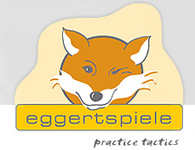The four tournament games played at the European championships of 2018 were:
- Pulsar 2849 – CGE
- Keyper – R&D games
- Clans of Caledonia – Karma Games
- Heaven & Ale – Eggertspiele
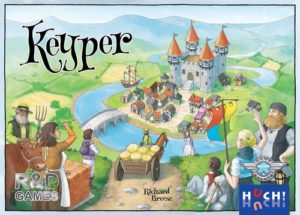
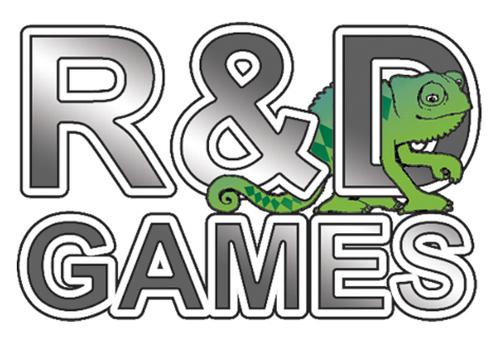
Richard Breese
Keyper is a game with high player interaction for two to four players played over four rounds. Each round represents a season: spring, summer, autumn and finally winter.
Keyper is a worker placement game. (Keyper is the eighth new title in the medieval Key series of games, with Keydom, the second in the series being widely recognized as the first of the worker placement genre of games.) What makes Keyper special is that when one player places a keyple on a country board, another player can join them with a matching colored keyple on the first player’s turn to the benefit of both players. In this way some players are likely to have played all their keyples before others. All keyples have the potential to work twice. If a player has played all of their keyples, but another player still has some, then on their turn the player with no remaining keyples can lay down one or more keyples on the country board they have claimed or in their village board to secure additional resources or actions. It can therefore be doubly beneficial to co-operate with your fellow players, although Keyper is not a co-operative game in the usual sense of the term.
The country boards are also noteworthy in that they can be manipulated and folded at the beginning of summer, autumn and winter to show one of four different permutations of fields for that season. A player will chose the one to suit their strategy, often hoping that another player will complement their choice. Certain fields on the country boards are available only in certain seasons, e.g., raw materials can be upgraded to finished goods only in spring and summer after which you can only convert using tiles in your own village. Gem mining occurs only in autumn and winter.
A player’s strategy is likely to be influenced by which (seeded) spring country tiles they acquire and by the particular colored keyples they have available in the later seasons. Different combinations will encourage a player to develop their farm or village, help with their shipping or mining activities, and prepare for the seasonal fairs. Players constantly need to evaluate whether or not to join other players, when to claim a country board, whether to play on their own or another player’s country board, when to use their own village, and whether to create a large or small team of keyples for the following season. The winner is the player to gain the most points, usually through pursuing at least a couple of the different strategies.
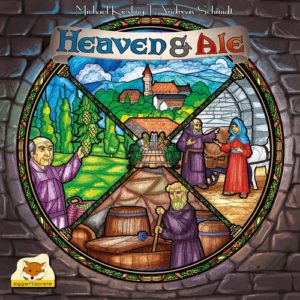
You have been assigned to lead an ancient monastery and its brewery. Now it’s your time to brew the best beer under God’s blue sky!
The fine art of brewing beer demands your best timing. In order to get the best results of your production, you have to provide your cloister’s garden with fertile resources and the right number of monks helping with the harvest — but keep your brewmaster in mind as he is ready and eager to refine each and every one of your barrels!
In Heaven & Ale, you have to overcome the harsh competition of your fellow players. There is a fine balance between upgrading your cloister’s garden and harvesting the resources you need to fill your barrels. Only those who manage to keep a cool head are able to win the race for the best beer!


Vladimír Suchý
It is the year 2849, one millennium after the Gold Rush, and the mining of raw materials has reached a whole new level. Humankind has successfully tested the first Stellar Mirror and harnessed enough power from a Pulsar to open the first space gate.
A New Era has just begun… Draft dice to explore the universe in Pulsar 2849. Each round, roll dice based on the number of players, sort them based on their values, then draft dice to take actions, such as adding another spaceship to your fleet or visiting (or flying through) an unexplored star system or tagging a pulsar with one of your identity rings or advancing on your personal tech track, which differs from those of other players. At the end of the round, the turn marker advances based on the dice rolled that turn, and when the marker reaches the end of the track, the game ends.Players score points each round based on what they’ve discovered and explored, and everyone has hidden goals that they want to achieve, while also trying to claim the right to public goals that supply additional endgame scoring.
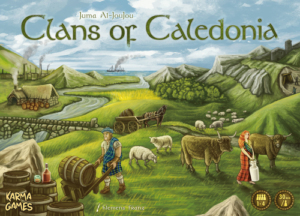

Juma Al-JouJou
Clans of Caledonia is a mid-to-heavy economic game set in 19th-century Scotland. At this time, Scotland made the transition from an agricultural to an industrialized country that heavily relied on trade and export. In the following years, food production increased significantly to feed the population growth. Linen was increasingly substituted by the cheaper cotton and raising sheep was given high importance. More and more distilleries were founded and whisky became the premium alcoholic beverage in Europe.
Players represent historic clans with unique abilities and compete to produce, trade and export agricultural goods and of course whisky!
The game ends after five rounds. Each round consists of the three phases:
- Players’ turns
- Production phase
- Round scoring
- Players take turns and do one of eight possible actions, from building, to upgrading, trading and exporting. When players run out of money, they pass and collect a passing bonus.
- In the production phase, each player collects basic resources, refined goods and cash from their production units built on the game map. Each production unit built makes income visible on the player mat. Refined goods require the respective basic resource.
- Players receive VPs depending on the scoring tile of the current round.
The game comes with eight different clans, a modular board with 16 configurations, eight port bonuses and eight round scoring tiles.
With many thanks to boardgamegeek.

